

Sir Frederick Grant Banting 1891 - 1941
- occupation:
- Medical researcher,
- Physician
- Nationality:
- Canadian
- born in:
- Ontario, Canada
Canadian doctor Frederick Banting and American biomedical scientist Charles Best co-discovered insulin in 1921. This is a life-saving treatment for diabetes.
Banting became interested in diabetes when working at the University of Western Ontario. In the early 1920s doctors hypothesised that lack of insulin, a hormone made in the pancreas, caused the illness. However, insulin had proved impossible to extract from the pancreas.
Banting got an idea of how to extract insulin from a medical journal article, but he needed laboratory facilities for further investigations. He convinced John Macleod, Professor of Physiology at the University of Toronto, to let him use a laboratory to conduct his research. Macleod appointed Charles Best, a biomedical science student, as Banting’s assistant.
Banting and Best performed pancreas experiments on dogs to measure sugar in their urine and blood. Over a summer they extracted the first antidiabetic substance. In January 1922 a diabetic teenager called Leonard Thompson was the first person to receive an insulin injection.
Banting and Best received many awards for their discovery. However, only Banting and Macleod received the Nobel Prize in Medicine in 1923. In protest, Banting shared half his award money with Best. In 1929, Best succeeded Macleod as Professor of Physiology at the University of Toronto. Banting was killed in an air disaster in Newfoundland in 1941.

